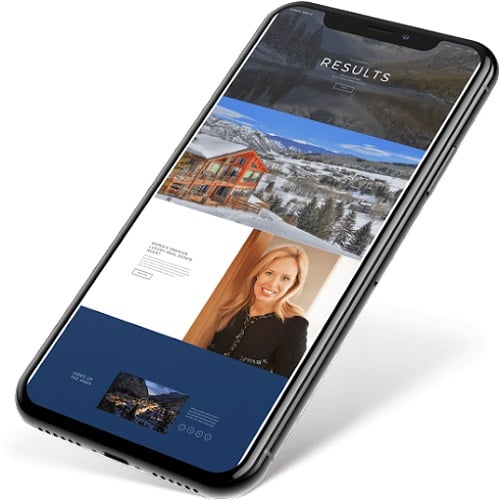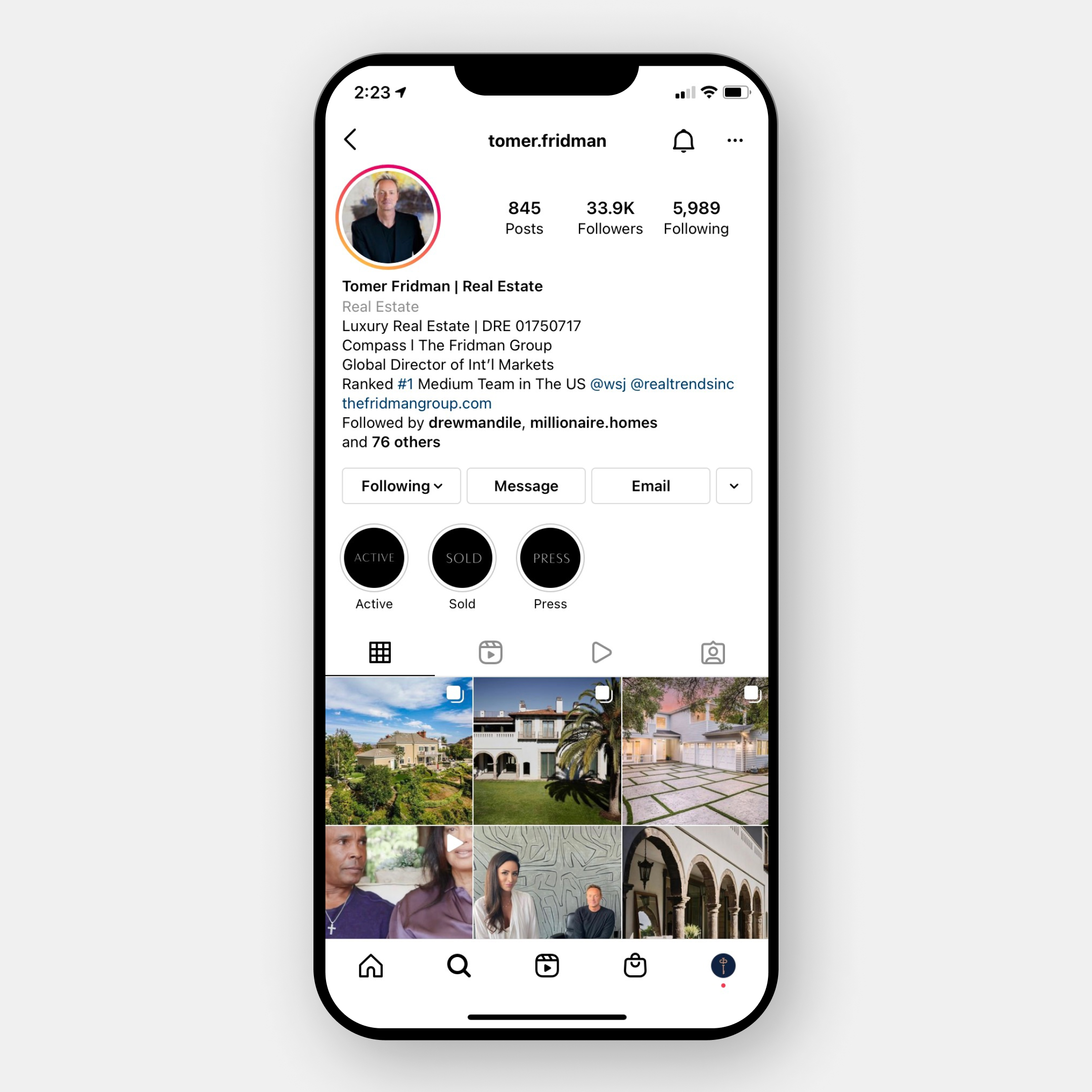Let Others Do the Selling for You:
The Power of Social Proof in Your
Real Estate Business
JULY 26, 2021
It can mean the difference between a full client load and an empty calendar.
Although the advice to choose a niche as a real estate agent is quite common, many new professionals don’t do so. Whether it’s due to the fear of making the wrong decision, a lack of understanding of the market, or a lack of faith in the “why” behind the advice, very few realtors start off strong with a niche.
However overwhelming the choice may be, it’s well worth it. The importance and impact of strategically choosing — and marketing to — a specific real estate niche simply cannot be understated.
What is a Niche?
A niche is a subset of the market you will focus on in your business. Choosing a niche means defining the specific group of people or types of properties that you will zoom in on as a real estate professional.
Endless niche options exist for realtors because niches can be narrowed down based on the types of properties you focus on, on location, or on qualities of a subset of clients. For example, some realtors specialize in working with first-time homebuyers or clients who are actively serving in the military.
Others zoom in on luxury real estate, mountain homes, farms, or oceanfront properties. The options are endless, and there are no wrong answers; what matters is getting clear about what your specialty is and who you serve!
Why Choose a Niche?
Choosing a niche or specifying a niche is often called “niching down” and can feel counterintuitive at first. Anyone in professions meant to serve people, realtors included, naturally tend to believe that the best approach to their business is to help anyone and everyone. After all, why would you want to “rule out” any portion of the population that’s in search of a realtor?
In reality, instead of ruling people out, strategically choosing a niche means you draw the right people in. Choosing a niche helps you position yourself strategically and intentionally to potential clients — the right potential clients for you. When you get specific about who you serve and how to do so, you instantly stand out from the sea of qualified real estate agents in your area.
What is social proof and how can you use it
to grow your real estate business?
What is social proof and how can you use it to grow your real estate business?
What strategies do you have in place to market to your ideal clients and get
ahead of your competition? If you’re like many real estate agents, you spend
the majority of the time when you’re not actively selling a home trying to find
new clients who need to buy or sell. This takes up valuable time and energy
and, after getting a new client, you find yourself back at square one. Wouldn’t
it be better to let others do the selling for you so you could focus on what you
love doing—buying and selling homes? It’s possible when you harness the power
of social proof. Here is what social proof is and how it can take your marketing
to the next level.
What strategies do you have in place to market to your ideal clients and get
ahead of your competition? If you’re like many real estate agents, you spend
the majority of the time when you’re not actively selling a home trying to find
new clients who need to buy or sell. This takes up valuable time and energy
and, after getting a new client, you find yourself back at square one. Wouldn’t
it be better to let others do the selling for you so you could focus on what you
love doing—buying and selling homes? It’s possible when you harness the power
of social proof. Here is what social proof is and how it can take your marketing
to the next level.
What is Social Proof?
What is Social Proof?

Database Marketing Strategies
The Importance of Your Website as a Realtor
Why is Your Database So Important?
Your database is your key to staying in touch with those who may do business with you or who are likely to give you referrals. If you don’t have a way of keeping in touch with them and engaging with them, they will likely forget about you and their business (or referrals) will go elsewhere.
While many agents think they can keep track of those they need to touch base with by retaining their business cards, writing them down in their planner or simply remembering who they are, most are not organized and disciplined enough to do so. They need to rely on a system that involves not only building their database, but also effectively using that database to develop marketing campaigns that can include email newsletters, text campaigns, phone calls, or social media marketing strategies.
Some real estate agents decide to split their databases into two distinct groups: a lead generation group that includes only those who the realtor is attempting to gain as clients, and a sphere of influence group that includes past clients, networking and referral partners, and others who are likely to pass their names on to others who need a real estate agent. While both of these types of databases are useful, most agents find they get more business from their sphere of influence group than their lead generation group — especially if they are not using a professional, unique lead gen system.
What Mistakes Do Agents Make When Building Their Database?
Many agents suffer from “shiny object syndrome” when it comes to building their database. Instead of playing the long game and focusing on ways to slowly build their database with solid leads and close spheres of influence, they jump on the latest and greatest marketing trend and shift their efforts to a strategy they think will make them some quick sales. Unfortunately, a change in algorithm or other occurrences out of your control can easily put an end to the effectiveness of trendy marketing techniques. When you focus on building a solid database, you’ll insulate your business from external changes and reap the benefits a few years down the line when your list pays dividends and your income skyrockets.
Other agents do a good job of building a strong database, but then fail to utilize it by not creating a robust marketing strategy connected to it. Compiling the names is only part of the battle. The more important component is developing a system that consistently engages those in your database to keep them up to date and interested in what you are currently doing. Your system also needs to have “triggers” to let you know when someone in your database is at a stage where they might make the decision to work with you or pass on a referral so you can follow up with a phone call or an in-person meeting.

The Wrong Messaging
Build and Market to Your Database
As a realtor, your database is your best friend. This is your list of past, current, and prospective clients as well as referral sources who can help grow your business. A basic rule of thumb is that an effective database consists of around 1000 names and contact information. Once you’ve built a solid database, you can market to your contacts through regular email newsletters, texts, or personal invitations to events or open houses. The marketing you do to your database should follow the same guidelines as your social media marketing: keep content informational and helpful rather than salesy. This keeps your contacts engaged with your brand and ensures they will continue to pay attention to what you have to say even when they are not actively looking to buy or sell real estate.
Harness the Power of Social Proof
The theory of social proof states that people are likely to conform and copy the actions of those in their peer group or those they view as experts or who are trustworthy. When it comes to real estate marketing, you can take advantage of social proof by featuring testimonials on your site and social media, soliciting online reviews from those you’ve done business with, and by establishing yourself as an authority on the local real estate market with helpful, informative content. When you harness the power of social proof, you essentially have others selling for you and no longer have to hustle or chase leads.

2. Links to Active Social Media Profiles
Having a strong social media presence shows your
potential clients that you are up to date, active in the
industry, and committed to connecting with those you
work with. To make it easy for your website visitors to
connect with you on social media, make sure you add
links to each of the platforms you are on.

2. Links to Active Social Media Profiles
Having a strong social media presence shows your
potential clients that you are up to date, active in the
industry, and committed to connecting with those you
work with. To make it easy for your website visitors to
connect with you on social media, make sure you add
links to each of the platforms you are on.
Database Marketing Strategies

The Right Messaging

Social proof is a phenomenon where people look for reference to determine how
to behave in a certain situation. For example, if someone is trying to decide which
realtor to select to help them sell a home, they will look to their peers, those they
look up to, or recognized experts in the industry to show or tell them who they would
select (or have already selected) in the same situation. They want to see proof that
you’ve done a good job for others so they will know you’ll do a good job for them.
What are Different Types of Social Proof?
There are different types of ways to leverage social proof for your real estate business.
Social proof-based word-of-mouth has long been considered one of the best forms of
advertising, but you need to find ways to drive that word-of-mouth for it to be effective.
Here are some examples of social proof:
■ Ratings and reviews. Positive reviews on Zillow, Facebook, Google, and Yelp are
powerful form of social proof. Studies have shown that 91% of those looking for
products or services read online reviews and nearly 84% of those people actually
trust the information in reviews as much as they trust recommendations from their
friends.
■ Social media. Being active on social media and having numerous likes, shares, and
comments from those your users like, trust, or look up to is an important part of
social proof.
■ Results. Sold properties, years of experience, and past transactions are social proof
that you’ve been in business helping others and will do the same for those seeking
your services.
■ Testimonials. Testimonials—especially video testimonials—of happy past clients
talking about their experience with you are another example of using social proof to
your advantage.
■ Useful local content. When you share information about the neighborhood you serve
that is educational or informative, you show that you are knowledgeable about the
area and can be trusted to provide solid advice.
Why is Using Social Proof Important?
When you effectively use social proof, you let others do the selling for you. This builds
trust within your market, you’re seen as more credible, and you don’t have to work as
hard to find new clients. With social proof, you can establish yourself as an authority in
the local real estate scene and can easily overcome objections and grow your agency.
When you have social proof working for you, you no longer have to “sell” yourself because
you’ll have past and current clients and other trustworthy individuals doing all the
work for you.
Using Social Proof to Market Your Agency and Listings
When developing your website, landing pages, and advertising campaigns, utilizing
social proof should be high on your priority list. Here are some ways you can build it
into your marketing strategies:
■ Curate positive online reviews. To get the most online reviews, you need to have a
system of asking for them from your past clients. There are programs available that
automate the process of asking for reviews that allow you to review them, respond to
them, then push them out to multiple review sites for maximum exposure.
■ Maintain an active social media presence. Being active on social media means posting
regularly (at least three or four times a week) and focusing on posting content that is helpful, informative, or educational as opposed to just selling your services or posting listings and
open houses.
■ Make sure your website has information on your background. Too many agents skimp
on information under the bio section of their websites. This is the place to talk about how
many years you’ve been in the business, how many clients you’ve helped buy or sell a home,
and how many transactions your team has conducted.
■ Ask for and facilitate testimonials. Even if your clients have an amazing experience with
you, they won’t offer up testimonials—you need to ask for them. To get the powerful video
testimonials that are powerful forms of social proof, offer to have a videographer come
to their home or office to film them. Then use the testimonials on your website and
social media to share the positive experience with your prospects and others in the
industry.
Working with an Expert
Using social proof to market your agency and get more clients is one of the most powerful
ways you can grow your team. However, it’s time consuming and you have to know what
you’re doing. Instead of taking time away from your business and what you do best, you
need to work with an expert who has experience in developing social proof-based
marketing strategies. Some larger teams can employ in-house marketing specialists
who can develop campaigns for them. If you have a smaller team, you likely won’t have
this luxury and should instead consider partnering with an expert in the real estate
marketing industry. When you work with a marketing agency that has proven methods
of utilizing social proof to grow their clients’ businesses, you can take the stress off your
shoulders and put your energy into serving your clients.
Ready to work with a team who can help you use social proof to its fullest potential?
Reach out to the team at Luxury Presence. We’d love to partner with you.
Social proof is a phenomenon where people look for reference to determine how
to behave in a certain situation. For example, if someone is trying to decide which
realtor to select to help them sell a home, they will look to their peers, those they
look up to, or recognized experts in the industry to show or tell them who they would
select (or have already selected) in the same situation. They want to see proof that
you’ve done a good job for others so they will know you’ll do a good job for them.
What are Different Types of Social Proof?
There are different types of ways to leverage social proof for your real estate business.
Social proof-based word-of-mouth has long been considered one of the best forms of
advertising, but you need to find ways to drive that word-of-mouth for it to be effective.
Here are some examples of social proof:
■ Ratings and reviews. Positive reviews on Zillow, Facebook, Google, and Yelp are
powerful form of social proof. Studies have shown that 91% of those looking for
products or services read online reviews and nearly 84% of those people actually
trust the information in reviews as much as they trust recommendations from their
friends.
■ Social media. Being active on social media and having numerous likes, shares, and
comments from those your users like, trust, or look up to is an important part of
social proof.
■ Results. Sold properties, years of experience, and past transactions are social proof
that you’ve been in business helping others and will do the same for those seeking
your services.
■ Testimonials. Testimonials—especially video testimonials—of happy past clients
talking about their experience with you are another example of using social proof to
your advantage.
■ Useful local content. When you share information about the neighborhood you serve
that is educational or informative, you show that you are knowledgeable about the
area and can be trusted to provide solid advice.
Why is Using Social Proof Important?
When you effectively use social proof, you let others do the selling for you. This builds
trust within your market, you’re seen as more credible, and you don’t have to work as
hard to find new clients. With social proof, you can establish yourself as an authority in
the local real estate scene and can easily overcome objections and grow your agency.
When you have social proof working for you, you no longer have to “sell” yourself because
you’ll have past and current clients and other trustworthy individuals doing all the
work for you.
Using Social Proof to Market Your Agency and Listings
When developing your website, landing pages, and advertising campaigns, utilizing
social proof should be high on your priority list. Here are some ways you can build it
into your marketing strategies:
■ Curate positive online reviews. To get the most online reviews, you need to have a
system of asking for them from your past clients. There are programs available that
automate the process of asking for reviews that allow you to review them, respond to
them, then push them out to multiple review sites for maximum exposure.
■ Maintain an active social media presence. Being active on social media means posting
regularly (at least three or four times a week) and focusing on posting content that is helpful, informative, or educational as opposed to just selling your services or posting listings and
open houses.
■ Make sure your website has information on your background. Too many agents skimp
on information under the bio section of their websites. This is the place to talk about how
many years you’ve been in the business, how many clients you’ve helped buy or sell a home,
and how many transactions your team has conducted.
■ Ask for and facilitate testimonials. Even if your clients have an amazing experience with
you, they won’t offer up testimonials—you need to ask for them. To get the powerful video
testimonials that are powerful forms of social proof, offer to have a videographer come
to their home or office to film them. Then use the testimonials on your website and
social media to share the positive experience with your prospects and others in the
industry.
Working with an Expert
Using social proof to market your agency and get more clients is one of the most powerful
ways you can grow your team. However, it’s time consuming and you have to know what
you’re doing. Instead of taking time away from your business and what you do best, you
need to work with an expert who has experience in developing social proof-based
marketing strategies. Some larger teams can employ in-house marketing specialists
who can develop campaigns for them. If you have a smaller team, you likely won’t have
this luxury and should instead consider partnering with an expert in the real estate
marketing industry. When you work with a marketing agency that has proven methods
of utilizing social proof to grow their clients’ businesses, you can take the stress off your
shoulders and put your energy into serving your clients.
Ready to work with a team who can help you use social proof to its fullest potential?
Reach out to the team at Luxury Presence. We’d love to partner with you.
Now that you understand that talking yourself and your accomplishments up on your site is the wrong messaging, let’s take a look at the content that works. Here are some tips on creating messaging that resonates with your target audience:
Content that is helpful. What are the issues your ideal client is dealing with? Are they attempting to buy and sell homes at the same time and need assistance with financing a down payment? Are they struggling to find a home they are interested in due to low inventory? Are they trying to decide if they should relocate or buy a second home now that they are empty-nesters? Identify the pain points in your target market, then address those points through blog posts that you then share on social media and in newsletters that go out to your database.
Content that establishes you as an expert. Those looking for help buying or selling property want to work with the best. To show that you are an expert in your local community and industry, develop content that revolves around neighborhood events, local real estate news, and other industry issues.
Content from experts and past clients. When you use the power of social proof to develop your website content, you let others do the selling for you. Social proof is the phenomenon where others copy the actions of people they see as peers or as trusted individuals. If they see your past clients talking about your high level of customer service in a video testimonial or read reviews from experts in the industry who have worked with you, they will be more likely to choose you as their realtor.
Content that stays ahead of the game. Your ideal client wants to know what’s going on in the industry as soon as possible. They also don’t want to read the same old content on your site that they’ve read on all your competitors’ sites. To address these needs, stay on the cutting edge of the industry and share information your visitors can’t get anywhere else.
Components of an Effective Lead
Generation System


How the Right Messaging Increases Conversions
Additionally, choosing a niche allows you to optimize your time and deep-dive into the knowledge and skills needed to best serve your clients. There are countless nuances, specialized documents, and small bits of information that are pertinent to any niche, and trying to serve all niches equally well can quickly lead to burnout.
For example, realtors who specialize in helping military families can serve them best by learning all there is to know about VA loans and the best local lenders. On the other hand, if you’re a “generalist” and only take on one or two military clients each year, it’s likely that you’ll end up doing research on VA loans on the fly without being able to do a true deep dive. Choosing a niche frees up your time and energy while also allowing you to provide the very best service to your clients.
While remaining general and marketing yourself as a great real estate agent can work to bring in clients, you instantly cut through the noise when you position yourself as a specialist for a particular type of transaction, home, or person. Many people know what they want out of their real estate experience, so quickly identifying yourself as someone who can provide that specific result will go a long way in filling your inbox with qualified leads.
Choosing a niche and producing online content focused on that niche will also boost your SEO considerably, making it much easier for anyone searching the internet to discover you. SEO for realtors can work as an ongoing source of leads and revenue without much manual effort.
Once you’ve narrowed down your target market and begun producing content relevant to them, your web content will rise to the top when prospects search the internet for the solutions to their problems! As great as it feels to receive a referral or recommendation from a former client, optimizing your web presence will prevent you from leaving money on the table when clients without connections go to search for an agent.
Beyond that, niching brings some ease into your marketing and processes. It’s much easier to create relevant content and provide value when you know who you’re talking to! You’ll quickly establish yourself as an expert in your niche, even if you’re new to the real estate profession.
LATEST POST
Learn the latest marketing and tech trends from our
marketing gurus and contributing industry experts.

NOVEMBER 30, 2021
HOW TO SET UP A TESTIMONIAL-GENERATION SYSTEM IN YOUR BUSINESS

NOVEMBER 16, 2021
6 WAYS YOU CAN DEMONSTRATE YOUR EXPERTISE WITH SOCIAL MEDIA

FOR THE 2ND YEAR IN A ROW, LUXURY PRESENCE RANKS NO. 598 ON THE 2021 INC. 5000
NOVEMBER 11, 2021
THE POWER OF FORMING STRATEGIC PARTNERSHIPS WITH REFERRAL PARTNERS


